Nexus of Good: Transformative empowerment
Through multifaceted support to teachers, alongside fostering partnerships and implementing evidence-based practices for sustainable educational reforms, Centre for Intrinsic Motivation has been enhancing student learning outcomes

India's education system has made significant strides in increasing enrollment rates, yet the nation faces a pressing challenge: poor learning outcomes among its children. Despite efforts to improve access to education, many students struggle with fundamental skills such as reading, writing, and critical thinking. The National Education Policy underscores the pivotal role of teachers in addressing these challenges. However, inadequate support and mentoring often hinder their effectiveness in the classroom, resulting in limited impact on student learning.
Centre for Intrinsic Motivation (CIM) is committed to improve student learning outcomes by prioritizing teacher support and motivation. Since its inception in 2014, CIM, a flagship initiative of Schools and Teachers Innovating for Results (India), has focused on a behaviour change approach and built agency and mastery of teachers and education officials to improve the quality of education. CIM is actively working in Delhi, Tamil Nadu, and Karnataka to empower teachers and students across these regions.
At the core of their strategy lies a deep commitment to enhancing the quality of education in government schools by prioritizing teacher support and motivation. There is a recognition that motivated and empowered teachers are essential for driving meaningful change in the classroom. Through collaborative partnerships with governments, educational institutions, and other stakeholders, CIM works to embed sustainable changes within the education ecosystem. CIM’s approach is rooted in evidence-based practices and emphasizes the importance of autonomy, mastery and purpose.
CIM envisions a world where children love learning and are prepared for the challenges of tomorrow. Its mission is to cultivate intrinsic motivation in teachers and officials, leading to a transformative shift in the education system.
CIM's initiatives have brought about a significant transformation in the education landscape. Their reach extends to 4.8 lakh teachers and 92 lakh children yielding tangible results in the following areas:
● Improved student outcomes: Students enrolled in schools supported by CIM show progress in both academic and socio-emotional skills.
● Empowered teachers: Teachers become more engaged and motivated, driving positive changes in their classrooms.
● Effective leadership: State and district leaders develop the skills needed to implement educational priorities effectively.
The impact of education extends far beyond the individual student—it shapes the future of communities, societies, and nations. In India, where millions of children are enrolled in government schools, the quality of education is a critical determinant of social and economic progress. By investing in teacher support and motivation, CIM contributes to economic prosperity, social mobility, and the overall well-being of society. Moreover, by equipping students with the knowledge, skills, and dispositions they need to succeed, CIM empowers them to realize their full potential and become active participants in shaping a better future for themselves and their communities.
“Teacher agency is key. We support teachers to build the mastery of their topics, understand the needs of their classroom and contextualise the training they receive. If teachers within the system are empowered, the change is sustained,” said Swaha Sahoo, Director, CIM.
CIM's programme implementation structure is designed to be collaborative, responsive, and contextually relevant. The operation is at multiple levels, working closely with stakeholders at the state, district, block, and cluster levels to ensure that the interventions are tailored to local needs and priorities. The approach is iterative and adaptive, that allows learning from experience and enables continuous improvement in practices.
● State level: At the state level, CIM collaborates with government officials to design and implement teacher training plans, develop policies and guidelines, and provide technical assistance and support. It works closely with state education departments to build their capacity to lead educational reform efforts and ensure that the interventions are aligned with state priorities and initiatives.
● District level: At the district level, CIM provides training, coaching, and support to district leaders, including district education officers, block education officers, and other key stakeholders. District leaders are helped to develop their leadership skills, strengthen their capacity to manage change, and build effective teams. Support is also provided to district leaders in developing and implementing evidence-based practices that priorities student learning and well-being.
● Block and cluster level: At the block and cluster levels, CIM provides targeted support to schools, teachers, and communities. It works closely with block and cluster-level officials, including block resource coordinators, cluster resource coordinators, and school principals, to strengthen their capacity to support teachers and improve student learning outcomes. Training, mentoring, and coaching is also provided to teachers, helping them enhance their pedagogical skills and instructional practices.
Key past projects include CIM’s partnership with a corporate (May 2023 -March 2024) aimed to reignite intrinsic motivation among officials, children, and teachers in Tamil Nadu and Karnataka, thus fostering positive changes in the learning environment.
CIM also collaborated with a leading non-profit organization (June 2023- March 2024) to transform learning environments for students in Tamil Nadu through the professional development of teachers.
CIM has recently partnered with a tech major for a project titled "Improving Quality of Education through Technology Adoption & Behavior Change", aimed at enhancing teacher capacity. Operating in Delhi, Karnataka, and Tamil Nadu, this initiative targets head teachers, teachers, and students in government schools across the three states.
What CIM has accomplished under the inspired leadership of Swara Sahoo—its Executive Director—and a committed team through public-private partnership is a wonderful example of Nexus of Good. They have been able to scale their model successfully through such partnerships in various states.
Views expressed are personal




